

Privatisation, but no private property. Every time I hear about yet another programme of privatisation I feel like asking: how can assets be converted into a form of property that does not exist in Russia? For that matter things are not so clear with state property either. Let’s start with that. The collective-private property of the bureaucracy The concept of state owned property is to a large extent a judicial fiction.
Especially when it is called public property, or ‘the people’s’ property, as it was known in Socialist times. 'Autocracy is a black box. Kick Russia Out of the G-8 - by Anders Åslund. Russia's new president, Vladimir Putin, has recognized that he does not belong at the G-8 summit.

The G-7 should take him at his word. U.S. President Barack Obama needs to face up to two closely related issues: how to treat Russia, and, specifically, how to treat Putin, now that he has returned to office. Obama needs to rethink his "reset," as conditions have changed. Over the last four years, President Dmitry Medvedev improved Russia's relations with virtually everybody, while Prime Minister Putin ruled at home. But now Putin is back. Putin's Gazprom Problem. Just four years ago, the Western press commonly touted Russia's state-owned natural gas giant Gazprom as Vladimir Putin's premier instrument of power.
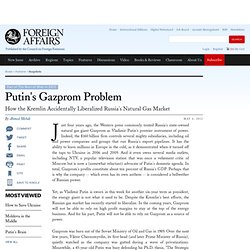
Indeed, the $160 billion firm controls several mighty subsidiaries, including oil and power companies and groups that run Russia's export pipelines. It has the ability to leave millions in Europe in the cold, as it demonstrated when it turned off the taps to Ukraine in 2006 and 2009. And it even owns several media outlets, including NTV, a popular television station that was once a vehement critic of Moscow but is now a (somewhat reluctant) advocate of Putin's domestic agenda. Peter Pomerantsev · Putin’s Rasputin · LRB 20 October 2011. The next act of Russian history is about to begin: Putin and Medvedev will pop off-stage into the Moscow green room, switch costumes, and re-emerge to play each other’s roles.
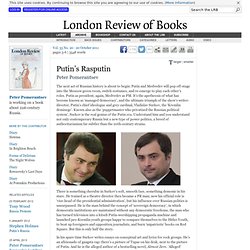
Putin as president, again, Medvedev as PM. It’s the apotheosis of what has become known as ‘managed democracy’, and the ultimate triumph of the show’s writer-director, Putin’s chief ideologue and grey cardinal, Vladislav Surkov, the ‘Kremlin demiurge’. Known also as the ‘puppetmaster who privatised the Russian political system’, Surkov is the real genius of the Putin era. Understand him and you understand not only contemporary Russia but a new type of power politics, a breed of authoritarianism far subtler than the 20th-century strains.
There is something cherubic in Surkov’s soft, smooth face, something demonic in his stare. In his spare time Surkov writes essays on conceptual art and lyrics for rock groups. Who runs Russia? Russians have an oddly reverential attitude about their gangsters.
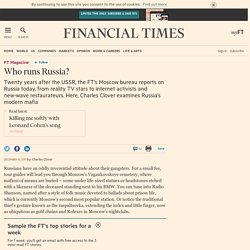
For a small fee, tour guides will lead you through Moscow’s Vagankovskoye cemetery, where mafiosi of means are buried – some under life-sized statues or headstones etched with a likeness of the deceased standing next to his BMW. You can tune into Radio Shanson, named after a style of folk music devoted to ballads about prison life, which is currently Moscow’s second most popular station. Or notice the traditional thief’s gesture known as the raspaltsovka, extending the index and little finger, now as ubiquitous as gold chains and Rolexes in Moscow’s nightclubs. Negotiating with the Kremlin. Russia's WTO Entry a Chance to Push Human Rights.
It is difficult not to be excited by the ongoing protest movement in Russia, which has seen the largest public demonstrations since the collapse of the Soviet Union—a serious challenge Vladimir Putin’s legitimacy and credibility.
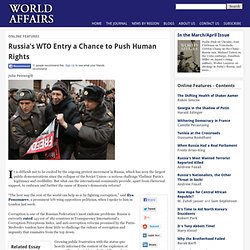
But what can the international community provide, apart from rhetorical support, to embrace and further the cause of Russia’s democratic reform? “The best way the rest of the world can help us is by fighting corruption,” said Ilya Ponomarev, a prominent left-wing opposition politician, when I spoke to him in London last week. Corruption is one of the Russian Federation’s most endemic problems. Russia is currently rated 143 out of 182 countries in Transparency International’s Corruption Perceptions Index, and anti-corruption reforms promised by the Putin-Medvedev tandem have done little to challenge the culture of corruption and impunity that emanates from the top down. Related Essay Man On A Mission: Bill Browder vs. the Kremlin. "Russia in Reverse" by Nicu Popescu. Exit from comment view mode.
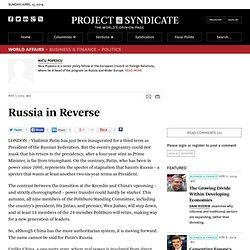
Click to hide this space LONDON – Vladimir Putin has just been inaugurated for a third term as President of the Russian Federation. A Tormenting in Moscow - Leon Aron. Russians are known for their warm welcomes, rolling out the red carpet for honored guests and ensconcing them in bear hugs, complete with three hearty kisses on the cheeks.

Perhaps the new U.S. Ambassador to Russia Michael McFaul didn't quite expect the same gracious reception given the frosty relationship between Washington and Moscow these days, but his first few months on the job have been unusual, if not downright hostile, a lot more Cold War than Russian Reset. Upon arriving in Moscow, the ambassador greeted his guests with an effervescent -- even hokey -- YouTube video introducing himself, a longtime student of and friend to Russia.
In response, he was met with an Arctic propaganda blast reminiscent of the early 1980s, and harassment likely without precedent for U.S. ambassadors -- either in the Soviet Union or in post-Soviet Russia. The Obama administration has since complained to the Russian government about the harassment of McFaul. But there is more to it than that. George Kennan, Michael McFaul, and Their Paranoid Hosts. 5:08 PM: Welceom [sic] to my life.
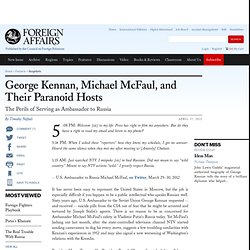
Press has right to film me anywhere. But do they have a right to read my email and listen to my phone? 5:14 PM: When I asked these "reporters" how they knew my schedule, I got no answer. Heard the same silence when they met me after meeting w/[Anatoly] Chubais. 1:15 AM: Just watched NTV. -- U.S. With Time Almost Up, Medvedev Issues First Political Pardon. Medvedev the Phony - By Lilia Shevtsova and David J. Kramer. The Russian political circus has extended its tour.
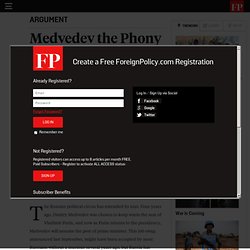
Four years ago, Dmitry Medvedev was chosen to keep warm the seat of Vladimir Putin, and now as Putin returns to the presidency, Medvedev will assume the post of prime minister. This job swap, announced last September, might have been accepted by most Russians without a murmur several years ago, but Russia has changed dramatically since then. The swap instead has deepened resentment among many in the country, who view it as a slap in the face.
In December, hundreds of thousands of Russians took to the streets against the rigged election, which in their eyes made Putin's presidency illegitimate. But where does this leave Medvedev? Why, then, would Putin keep Medvedev on as prime minister? Here is Medvedev's legacy in one sentence: He enabled Putin's personalized rule to continue unabated. Medvedev played his role to a T. Many in Russia hoped that Medvedev represented a real change from Putin and Putinism. Restored Elections Spell New Trouble for Kremlin. The abolition of gubernatorial elections by Vladimir Putin in 2004 was widely seen as the final act in dismantling Russia’s short-lived democratic system.
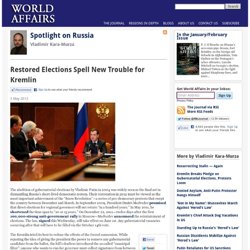
Their restoration in 2012 must be viewed as the most important achievement of the “Snow Revolution”—a series of pro-democracy protests that swept the country between December and March. In September 2009, President Dmitri Medvedev promised that direct elections for regional governors will not return “in a hundred years.” In May 2011, he shortened the time span to “10 or 15 years.”
On December 22, 2011—twelve days after the first 100,000-strong anti-government rally in Moscow—Medvedev announced the reinstatement of elections. The law, signed this Wednesday, will take effect on June 1st. Stolypin and Russia’s Veto of the Syria Resolution. The Russian veto of the UN Security Council resolution on Syria has had leaders and pundits in the West lining up to denounce the Russians, accusing them of revealing their autocratic tendencies and putting their own narrow trading interests (for instance arms exports) over issues of human rights.
A 100-year old document I found last week in the State Archive of the Russian Federation had me contemplating an alternative explanation, based on Russians’ experience of revolutionary upheaval. Historical parallels can, of course, be highly misleading, but people draw on them nonetheless, as the past represents the only practical experience available to them. Russia’s Syria Win. After 15 months and upwards of 13,000 dead, perhaps we should be grateful that the UN Security Council managed to condemn the Assad regime of something, even if only in a “non-binding” presidential statement. So far, the council has not issued a single binding resolution that carries the full weight of international law behind it. Nor will it, so long as Vladimir Putin believes the United States is not just angling for regime change in Damascus but in Moscow as well.
A close examination of the statement the council put out Sunday night shows that even in what should be diplomatic defeat, despotisms are still able to cajole the West into pretending that there is moral and military equivalence between a proven atrocity-maker and its victims. What Russia Gave Syria - By David Kenner. Syrian President Bashar al-Assad has had no better friend than Vladimir Putin's Russia. Just this week, three Russian ships reportedly headed to reinforce the Syrian port of Tartus. Lines in shifting sands: Russia’s response to the Syrian uprising.
Russian policy in the Middle East has been largely driven by pragmatic calculations of trade and geopolitical influence, in direct opposition to notions of liberal interventionalism and the ‘Arab Spring’. This week’s shocking massacre by Syrian forces in Houla, however, has fundamentally challenged the durability of that approach. Will Russia now fall in line with the position of its western partners?
Wonders Margot Light. This has been a bad week for the Russian government. Pipeline to Nowhere: The Beijing-Moscow Dance Continues. Negotiating and then building the proposed Russo-Chinese gas pipeline should be an easy win-win. Russia has enormous gas deposits in Western and Eastern Siberia; China has an omnivorous need for energy and the huge capital reserves that would be required to finance the operation. Russia's Eastern Anxieties. A Russian Spring? - Dominique Moisi.
Exit from comment view mode. Click to hide this space. Peeling, Meeting, and Shopping - Esther Dyson. Exit from comment view mode. Click to hide this space NEW YORK – In mid-December, while trying to understand what was happening in Russia, I checked Twitter and found a tweet that somehow signified everything. A Strategy for Russia’s Snow Revolution - Mischa Gabowitsch. Exit from comment view mode. "Has Russia Gone Back to Sleep?" by Georgy Satarov.
Exit from comment view mode. Click to hide this space. Russia’s Inevitable Democratization - Sergei Guriev and Aleh Tsyvinski. Exit from comment view mode. Click to hide this space MOSCOW – Twenty years ago, Soviet President Mikhail Gorbachev resigned, the Soviet Union ended, and Russia began an imperfect transition to democratic capitalism – a transition that has proven to be far more difficult than expected. The Snow Revolution’s Orange Shadow - Anders Åslund. Exit from comment view mode. Click to hide this space MOSCOW – Vladimir Putin’s regime is warning Russians that their budding “Snow Revolution” will be as big a mistake as Ukraine’s Orange Revolution of 2004. How the Anti-Putin Movement Missed the Point. Exactly how many protesters flooded central Moscow last Saturday to demand a "Russia without Putin" is difficult to pin down. The police put the total at 10,000; protest leaders claim 25,000.
What the Russian Protests Can. Last Saturday, tens of thousands of Muscovites gathered in the third mass protest in less than two months, chanting "Putin, ukhodi! " Is Russia’s protest movement a flash in the pan? Exactly half a year has passed since Russia’s parliamentary elections. Immediately after they took place, there were rallies and demonstrations across the country. To begin with, people were calling for fair elections.
Then, as their frustration grew, they started to demand that Vladimir Putin himself resign. At the time, many thought a fundamental change had taken place – that Russia had turned into a responsible society, intent on making its voice heard; a society which voiced its discontent, and inclined towards democracy. Russia’s Democrats Unite to Form Anti-Putin Party. Do authoritarian elections matter in Russia? Probably not as much as you think. Russia's Life and Death Election Standoff. The System Without Its Architect: The Kremlin Fires Surkov. Russia: The long life of Homo sovieticus. Reports Of The Bear’s Death Are Greatly Exaggerated. The Duck of Minerva: It’s Time to De-Russianize the BRICS. How the Soviets Squashed Dissidents. "The Road from Chernobyl" by Alexander Likhotal.
Joseph Stalin's deadly railway to nowhere. A Tale of Two Trials: Soviet Propaganda at Home and Abroad. Russia's Grandest Master.